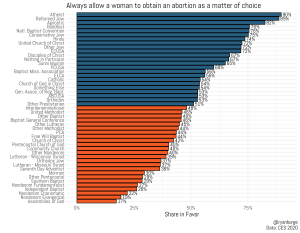After the U.S. Supreme Court overturned Roe v. Wade in late June, a group of college students stood outside the court praising the decision. Many of these people were part of Students for Life.
Students for Life is a pro-life advocacy organization that stridently opposes abortion. A representative of the organization also appeared recently on a national podcast to oppose birth control under the assertion that all contraceptive techniques (such as the pill or IUDs) induce abortions of unwanted pregnancies. She believes contraceptive medications made to prevent pregnancy are the same as abortifacients.
Kristi Hamrick, chief media and policy strategist with Students for Life of America, disputed this characterization after initial publication by BNG.
“SFLA does not engage one way or the other on contraception,” she said, “In this post-Dobbs world, Corporate Abortion is flailing for talking points, settling on access to birth control as one of their straw man arguments.Whether or not any individual has a point of view is irrelevant to the fact that your article claims that SFLA and SFLAction are promoting this as our agenda. It is not.
“And there is NO LEGISLATION OF ANY KIND that would end access to contraception, which again is defined as drugs and devices that prevent fertilization, despite Planned Parenthood’ recent efforts to change the language of the discussion.”
Ignoring science
The idea that pregnancy and fetal life begin when an egg and sperm unite at the moment of conception — the view promoted by Students for Life and published on its website — is not upheld by science. It is a religious belief the organization teaches as though it were fact.
This belief is contrary to what medical research says about contraceptives, which is that they aim to prevent pregnancies from occurring in the first place and should be used as a precaution against unwanted pregnancy.
“Doctors do not consider a person pregnant at the moment of fertilization.”
Doctors do not consider a person pregnant at the moment of fertilization (which can take up to six days after sex, depending upon the conditions of a person’s uterus). After fertilization, it is not until a successful implantation occurs that a person can be medically considered pregnant. This is approximately five to six days later and about two weeks after the sex act.

Students for Life activists
Students for Life derives its anti-contraception stance from its unfounded beliefs about the way contraceptives work. There is a big discrepancy between their views and reality.
Reveal News released a podcast Oct. 8 discussing this issue. Appearing in the podcast was Diana Blythe, chief of the contraceptive development program at the National Institute of Child and Human Development. She stated clearly that preventing fertilization and causing an abortion are not the same thing.
Just because an egg is fertilized does not mean it will reach the state of implantation. In fact, Blythe estimates that even without medication, about “half of fertilized eggs that get to the point of beginning implantation” do not finish the process successfully. These eggs “are lost” before a person even misses a period.
This is why doctors do not consider someone pregnant at this point. There is no guarantee that fertilization will actually lead to pregnancy, and often it does not.
This also is why doctors say contraceptives like the pill or Plan B are not abortifacients. They work to prevent fertilization, which is not considered pregnancy. In particular, these medications work “by preventing ovulation, meaning there’s no egg to fertilize to begin with” Blythe explained.
According to Blythe and other medical professionals, it is possible that hormonal contraceptives could work by preventing an already fertilized egg from implanting; however, there is no scientific evidence that supports this. This claim is based on speculation about things that might happen, but not on evidence of things that have been observed by science.
Thus, even using the definition of life asserted by Students for Life (that life begins at the moment of conception), we can still say it is very unlikely that using contraceptives like the pill or Plan B will work to terminate a life.
This speculative claim, however, remains the basis for Students for Life assertions about contraceptives.
What we believe
According to Students for Life, “if you’re using hormonal contraception, you are very likely using an abortifacient” and could be unintentionally causing an abortion. This is because, they state, “the pill can work by making it less likely an egg will be fertilized, but it can also prevent implantation of the fertilized egg. Since life begins at conception, this means it changes the body’s chemistry to reject a fertilized egg, which is the same as an abortion.”
“Their claim that the pill’s primary function is to prevent the implantation of a fertilized egg, and that this is an abortion, is not consistent with scientific research.”
Students for Life is partially correct — the pill does make it less likely that an egg will be fertilized. However, their claim that the pill’s primary function is to prevent the implantation of a fertilized egg, and that this is an abortion, is not consistent with scientific research.
Religious opinions about abortion are not isolated to Students for Life’s organizational values. According to researcher and statistician Ryan Burge, there are both supporters of and opponents of the right to obtain an abortion among many religious traditions.
Within traditions where more than half of members identify as pro-choice, 12 of those groups are Christian, including four Baptist groups: The National Baptist Convention (76%), the Baptist Missionary Association (56%), the General Association of Regular Baptist Churches (53%), and American Baptist Churches USA (53%).
Of traditions wherein less than half of members identify as pro-choice, there are 23 Christian groups. Of these groups, five are Baptist: Other Baptist (46%), the Baptist General Conference (46%), Free Will Baptists (44%), Southern Baptists (29%), and independent Baptists (26%).
 These data show both the influence of religious affiliation on one’s understanding of abortion, as well as the diversity of perspectives surrounding the issue. Compared to other religious traditions, Christians generally hold less support for abortion rights than other groups. However, even within the Christian tradition, there are many believers who identify as pro-choice.
These data show both the influence of religious affiliation on one’s understanding of abortion, as well as the diversity of perspectives surrounding the issue. Compared to other religious traditions, Christians generally hold less support for abortion rights than other groups. However, even within the Christian tradition, there are many believers who identify as pro-choice.
In other words, although organizations like Students for Life promote the religious ideal that life begins at conception, not every religious person’s beliefs about abortion is consistent with this message. As there is total disagreement from the scientific community, there is significant debate among the Christian community about what the beginning of life is and how ethical contraceptives and abortions are.
Religious liberty concerns
This issue, however, becomes bigger when policy changes and court rulings like overturning Roe v. Wade are influenced by popular religious ideals.
According to the American Constitution Society, a total ban on abortions can itself be a violation of religious freedom. For example, in the Jewish faith, life does not begin until a fetus takes its first breath after exiting the womb at birth. Jews also recognize a mother’s life, well-being and mental health, asserting there are some circumstances in which a woman must have an abortion, such as when the mother’s life is at risk.
This means the right to access abortion is a religious requirement for Jews — a notion supported by many rabbis.
Other religions have similar beliefs. Hindus, for instance, believe the right to abortion should be protected because their faith asserts that ethical choices must be made by individuals. Muslims also “permit abortions for specified reasons through the 120th day” of pregnancy to protect the life of the mother.
Health issues and the disabled
Blanket anti-abortion rulings also pose a health issue.
According to the Washington Post, many Americans with disabilities take medications that may unintentionally cause birth defects or otherwise harm a fetus or cause a pregnancy to fail. Some of these medications also reduce the efficacy of hormonal contraception, making it more likely that those taking them will get pregnant, even if they are on the pill.
Banning all abortions poses a threat to disabled persons who need these medications. Health care providers may stop prescribing medically necessary, and often life-saving, medications to disabled persons out of fear they could face legal consequences for distributing drugs that could be used as abortifacients.
Those with disabilities also are victims of higher rates of sexual violence compared to other populations. These populations also are at a higher risk of unplanned pregnancy and death during pregnancy. Further, if a disabled person is taking medications for their disability that could cause serious birth defects or fetal harm during pregnancy, their need for an abortion may be heightened.
When faced with these risks, disabled people may have to choose between having an abortion or not taking essential medications. If they become pregnant, depending on individual circumstance, having an abortion may be a life-saving procedure.
Unreliable alternatives to birth control
Negative sentiments surrounding contraceptive use (under the assumption that they are abortifacients) also impact women who are trying to, and trying not to, conceive.
Reveal News’s podcast noted that these pro-life sentiments are becoming popular issues among health-and-wellness influencers and, in turn, women are seeking natural alternatives to birth control. These methods, however, are not always reliable and can lead to unwanted pregnancies.
So, the discrepancy between science and pro-life advocacy groups about when life begins is not simply an issue of ideology, although many are influenced by religious belief. This is an issue that impacts the American population in diverse and complex ways.
Mallory Challis is a senior at Wingate University and serves this semester as BNG’s Clemons Fellow.
Related articles:
The Baptist war on contraception
Religious groups challenge contraceptive mandate in Supreme Court brief
SBC calls for ‘immediate abolition of abortion without exception or compromise’


